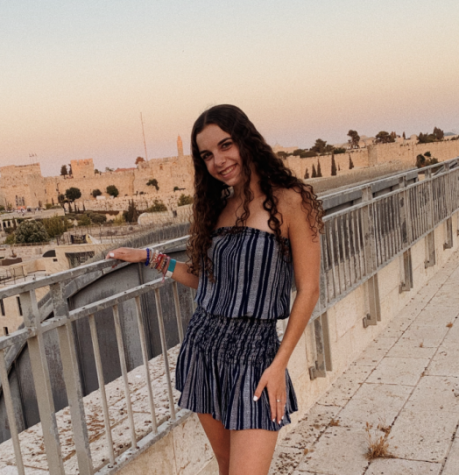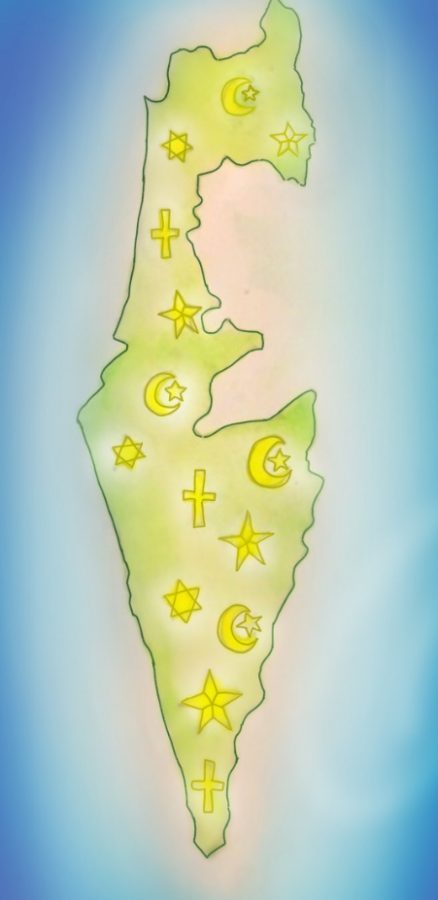One Tiny Country Home to Many Cultures
Israel is approximately the size of New Jersey, but, despite its small size, it is rich with many different and vibrant cultures. Within the quarters of Israel, Jews, Christians, Muslims, and Druze live in their communities side by side. Although Israel is technically a Jewish state, all of these religions have holy sites in the country and view Israel as their home. As one travels through Israel from one quarter to the next, he/she will notice the languages on the signs change, the clothing that the people are wearing change, and the prayer houses change. However, one thing remains constant: Most people living in Israel want nothing but to live peacefully within the country.
Jewish people make up 80% of the population in Israel. Israel became a Jewish state in 1948, for the first time in 2,000 years. While it may be assumed that all Jews living in Israel are religious, there is a large population of secular Jews living in Israel who identify with the country even more than the religion. All Jews living in Israel, whether they are secular or religious, must serve in the Israeli Defense Force (IDF) between the ages of 18-21.
There are many places in Israel that are holy to the Jewish people, including the Western Wall, which is a part of the Second Jewish Temple; Masada, which is where many Jewish rebels died; The City of David, where the famous King David lived and ruled; and Yad Vashem, the Israeli Holocaust Museum.
There are many aspects of daily life in Israel that reflect Jewish traditions and culture. Firstly, Hebrew is the official language of Israel, and it is also the language that Jews use to pray. Another aspect of Israeli culture that reflects the Jewish people are the store awnings, road signs, and product labels that are in Hebrew. There are Judaica stores throughout the country, including most tourist stops, providing a piece of Jewish tradition that travelers can take home with them. Additionally, the public school and work schedule correlate with the Jewish holidays, and stores are closed on Saturday, the holy day of the week for Jews. Some Jewish people live in major cities, such as Jerusalem and Tel Aviv, while others live in private communal communities, known as a kibbutz. While Jewish people make up a large portion of the population of Israel, they live alongside people of other cultures and beliefs.
The next largest religious group living in Israel are the Muslims, who make up 18% of the nation’s population, according to an article titled “Muslim’s Now Make Up 18% of Israel’s Population,” featured on Israel’s national news wbesite (israelnationalnews.com). Most of the Muslims who live in Israel are Sunni Arabs. They have complete civil rights and can live freely in Israel. While there is tension between the Muslims and the Jews, since the Jews have control of Jerusalem, this tension is rarely seen day to day. Muslims have lived in Israel since before it became a Jewish State in 1948, and even more Muslims are living in Israel today than were living there at the country’s inception. Israel is a place with many holy Muslim sites. The first of these is the Dome of the Rock in Jerusalem, which is where the Islamic prophet, Mohamed, is said to have risen to Heaven. Another sacred Muslim spot in Jerusalem is Al Aqsa Mosque, the third most important place of prayer for Muslims. Muslims have their own small communities all around Israel, and these places reflect many aspects of Islamic culture. There are shops that sell Arab spices and clothes in many markets in Israel, and there is an Arab Quarter of the Holy City, where many Arab-based products are sold.
Upon taking a closer look at the population of Israel, one will learn that only 2% of the population is Christian, according to the Pew Research Center (pewresearch.org). However, there are a broad number of places in Israel that are holy to Christians. Some of the holy Christian sites in Israel include Bethlehem, which is where Jesus was born; The Church of the Holy Sepulcher in Jerusalem, where Jesus was crucified; and The Garden of Gethsemana, where Jesus was said to have led his disciples to pray at the Last Supper. The European Christians largely inhabit Tel Aviv and cities in the southern parts of Israel, while the Christian Arabs live in northern Israel. The Christians usually tend to segregate themselves from other Israelis, but they have recently began to integrate their economic, political, and educational cultural aspects with the rest of Israel. However, the Christian religious life in Israel is kept independent. It is not a requirement for any Christian who lives in Israel to serve in the IDF, yet some choose to participate anyway.
The other minority group of people who live in Israel are the Druze, and they too make up approximately 2% of the population, according to an article produced by Israel National News (israelnationalnews.com) tiled “IDF Appoints Druze Officer to Head Medical Corps.” The first Druze people to settle in Israel settled in southern Lebanon. Now, most Druze communities are located on the hills in the north, to protect themselves against attacks. Daliyat el-Carmel is the largest Druze village in Israel today and was established approximately 400 years ago. The Druze have their own courts and religious leadership, but some Druze have obtained recognized positions in the military and government. The official language of the Druze people is Arabic, and their culture is heavily influenced by the Arabs. The Druze also have sacred religious sites in Israel. One place in Israel that holds religious importance for the Druze people is Jethro’s Tomb, a site that a Muslim leader’s dream led him to. The Druze have meetings there on Apr. 25 every year. Another is the Tomb of Al-Ya’afuri. Al Ya’afuri is a prophet who is only discussed in the Druze religion, making this tomb holy to the people of the Druze faith.
Everyone has a different idea of what Israel is about. When asked what first comes to mind when they think of Israel, three students gave very different responses. Sophomore Olivia Ackerman responded with, “[I think of] Jewish people praying at the Western Wall and how all the young boys go into the army.” Sophomore Chloe Moskowtiz, who was born in Israel, said, “[I think of] nature. It is really pretty there… But ultimately, when I think of the place I was born, I think about the beautiful surroundings.” Sophomore Sebastian Victor responded simply, “[I think of] God.” These responses show that Israel has a religious connection for many people.
When I visited Israel this summer, I saw firsthand the many different cultures that are present there. I visited many of the holy Jewish sites, including the Western Wall and the City of David; There were many tourists at these sites, some on Jewish tours and some who were not. Driving through the country, I saw many different people and their religious places of worship. I drove past many different churches, temples, and mosques, all so close to each other, in a country that is so small. I drove past towns with Hebrew, Arab, and English street signs. All of this proved that while Israel is a Jewish state, the daily life there reflects the traditions of so many other cultures.

I am Emma Ward, and I am the News and Opinions online editor for Horizon. In my free time, I enjoy playing tennis, working out, and hanging out with my...

















